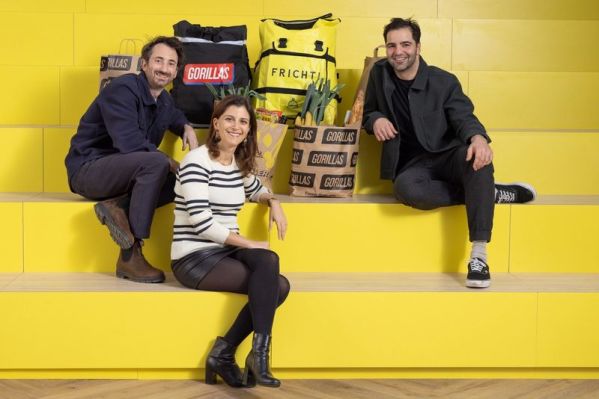German startup Gorillas has announced that it plans to acquire Frichti, a French startup that delivers both ready-to-eat meals and groceries. The acquisition hasn’t closed just yet but both companies have entered exclusive discussions.
“We don’t share details about the deal itself, especially as it isn’t completely signed,” Frichti co-founder and co-CEO Julia Bijaoui told me. “But it is correct to say that these are negotiations that should lead to Frichti getting acquired by Gorillas.”
When asked when the transaction is supposed to close, she told me it could take “a few weeks or a few months”, it’s still hard to tell exactly. Over the years, Frichti had raised around €100 million in total ($114 million at today’s exchange rate).
Gorillas is part of a group of startups that are trying to reinvent grocery deliveries in Europe. The company has raised nearly $1 billion in its most recent funding round and is already operating in eight markets — including France.
It competes with Flink, Zapp, Cajoo, Getir and Gopuff (following Dija’s and Fancy’s acquisitions). With these apps, customers can buy everything they would find in a small grocery store. And they all promise near-instant deliveries so that you don’t have to plan in advance when you need to order groceries.
In addition to this new crop of startups, other well-established companies are trying to position themselves as competitors to instant grocery startups. For instance, Deliveroo and Uber Eats are both emphasizing grocery deliveries in their respective apps.
Frichti, on the other hand, has been around since 2015, but with a different positioning. In the article that I wrote back in 2015, I called the startup a full-stack food delivery startup. The startup designs its own recipes, cooks ready-to-eat meals in its own kitchens, stores food in its own micro-fulfillment centers and handles deliveries with its own delivery service.
The result is a complete end-to-end service with a strong brand and reasonable prices. Over the past few years, the company has expanded to include fruits, vegetables, grocery items and private label products. It has served 450,000 customers in total across eight cities in France and Belgium.
The subcontracting incident of summer 2020
It’s a graceful exit for Frichti and the acquisition makes a ton of sense for Gorillas. Gorillas is acquiring a strong brand, a network of micro-fulfillment centers and a different segment in the delivery space.
Frichti and Gorillas will still operate as two different services in Frichti’s existing markets France and Belgium. As for Gorillas’ six other markets, the company could choose a different path.
“Honestly, we haven’t decided yet but it’s more likely that we scale many of the building blocks of Frichti’s product — but under an umbrella brand that could be Gorillas,” Frichti’s Julia Bijaoui said.
And because Frichti has been around for so long, Gorillas could learn a thing or two from Frichti. “We have had six years to build this model of quick commerce,” Bijaoui said. “We’re generating an operating profit, which is quite unusual in this industry.”
But the past 18 months haven’t been so easy for Frichti. In June 2020, Libération’s Gurvan Kristanadjaja reported that some of Frichti’s deliveries were handled by undocumented workers. According to Frichti’s founders, the startup wasn’t aware of that. Instead, Frichti, like all delivery companies, relied on subcontracting companies to hire delivery people and handle some deliveries for the platform.
And one of those subcontracting companies lured undocumented immigrants and told them that they could make money with Frichti deliveries. There was no work contract, no minimum pay.
That was just one example that highlighted a much bigger problem. Frichti checked the status of all its delivery partners to make sure that they have a proper working permit and get paid properly. The company underestimated the issue.
Instead of blaming Frichti, this crisis highlights a widespread problem with the subcontracting model and app-based gig work.
Hundreds of delivery people realized that they would lose their source of income. So they decided to protest and they blocked access to Frichti’s micro-fulfillment centers. During several weeks, Frichti simply couldn’t operate normally.
According to Libération, 200 out of 500 delivery persons working with Frichti didn’t have a residence permit.
That incident became a serious crisis that could have led to Frichti’s bankruptcy. A few weeks later, around half of the undocumented migrants who handled Frichti deliveries received a residence permit.
“We’ve had this incident during the summer of 2020. Clearly, we had some flaws in our process to check the identity and the permits of our delivery partners. It’s something that we have completely fixed today. We make sure that our delivery people have a residence permit and work in optimal conditions,” Bijaoui said.
“It’s an event that taught us a lot and I think we came out of it stronger because we partnered with them and helped them get residence permits,” she added.
Instead of blaming Frichti, this crisis highlights a widespread problem with the subcontracting model and app-based gig work. Account renting and dishonest subcontracting companies have been an issue for years.
And yet, both regulators and companies have been slow when it comes to implementing changes for the better. I’m sure the Frichti team is glad that it has turned this page of the company’s story, but I’m also sure there are other companies that will face similar incidents.
After years of exploding growth, there has been some consolidation in the food and grocery delivery space — as today’s acquisition proves once again. Let’s hope that these newly formed delivery giants won’t turn a blind eye on exploitation in the gig economy.
